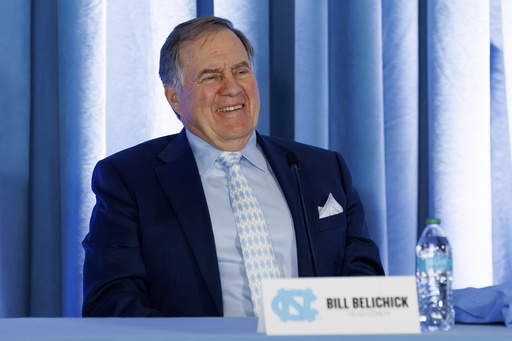
On Football delves into the major discussions surrounding the NFL each week. The insights and analyses can be found in detail on their platform.
Bill Belichick has decided not to wait for a potential call from an NFL team, which may never come. With limited options last offseason—only the Atlanta Falcons showed interest in interviewing him—and uncertainty surrounding future fits in the league, the 72-year-old celebrated coach is returning to the collegiate level. Belichick brought his extensive experience, including eight Super Bowl rings, to North Carolina, aiming to establish a college program reminiscent of the two dynasties he built during his lengthy tenure with the New England Patriots. His approach will undoubtedly reflect his signature “Patriot Way,” a style recognized and praised throughout football, and he hopes it can find its way into the culture at North Carolina.
The outcome of this new chapter remains to be seen, yet Belichick is back doing what he loves most: coaching. He plans to take the lead with his chosen staff, something that may not have been feasible with an NFL team giving him the level of autonomy he had enjoyed in New England. The potential for success at North Carolina could shift perspectives on him within the league.
Currently, Belichick’s pursuit of Don Shula’s record for all-time wins in the NFL is temporarily paused. He is 15 victories short of achieving that milestone, but his college contract includes a buyout clause—an expensive $10 million if he leaves before June 2025, reducing to $1 million post that date—which maintains the possibility of a return to the NFL in the future. If he chooses to stay in the college realm or retires without coming back to professional football, his legacy is secure. Excelling at North Carolina would only further enhance his reputation, while any potential losses wouldn’t tarnish his established NFL record.
Acknowledging Belichick’s impact, Dallas Cowboys executive Stephen Jones stated, “He’s one of the all-time great coaches. What he’s done for the NFL and the game, we all know where he’ll end up — in the Hall of Fame with a gold jacket.” Belichick recently signed a lucrative five-year contract with North Carolina, reportedly worth $10 million annually in base and supplementary pay, with additional bonuses that could reach up to $3.5 million.
Despite his accolades, Belichick has faced criticism. Many argue he was unable to replicate success without Tom Brady, highlighting his 29-39 record without the quarterback and the absence of playoff victories in his final four seasons with the Patriots. Others label him a cheater, referencing the Spygate and Deflategate controversies, as well as questionable decisions, such as overlooking Aaron Hernandez’s troubling past. His strict coaching style alienated some players, including Brady, who ultimately departed for the Tampa Bay Buccaneers, winning a Super Bowl in his first year away from New England.
Nevertheless, Belichick’s coaching philosophy emphasized the importance of diligence and accountability among players, leading to an extraordinary two-decade stretch of dominance that thrived amidst major challenges, including free agency and salary-cap limitations. Brady has consistently acknowledged Belichick’s significant role in shaping his successful career, crediting him as a foundational influence.
In an unexpected turn, Belichick is now set to embark on his collegiate coaching journey after a period spent rebranding himself as a lively and engaging analyst during the NFL season. His football acumen was evident during his television appearances, where he displayed a lighter side, cracking jokes and engaging playfully with well-known figures like the Mannings and Pat McAfee.
Belichick remarked during his introductory press conference that he had not been actively seeking a college opportunity. Instead, he was approached by multiple coaches who wanted to learn from his experiences. He discussed various aspects of college football, such as rule changes that align closely with those from the NFL, and noted the importance of adapting to new dynamics in player personnel and financial strategies.
While the question of how well Belichick will succeed as a college coach lingers, some former players have expressed skepticism regarding his transition. Brady hinted at concerns about Belichick’s effectiveness on the recruiting trail, while former teammates Rob Gronkowski and Julian Edelman shared similar reservations about the demands of college recruiting in the current era.
However, the landscape of college sports has shifted dramatically with the introduction of NIL, which may ease some pressures for coaches like Belichick. Just as Deion Sanders has made waves at Colorado, Belichick’s established reputation may carry significant weight in attracting talent without traditional recruitment methods.
“Overall, if he can navigate this evolving environment and find success, it could be invigorating for the game,” said Tampa Bay Buccaneers offensive coordinator Liam Cohen, emphasizing the potential positive impact on college football.
With this new undertaking, it’s now time for Belichick to demonstrate his coaching capabilities once again.
